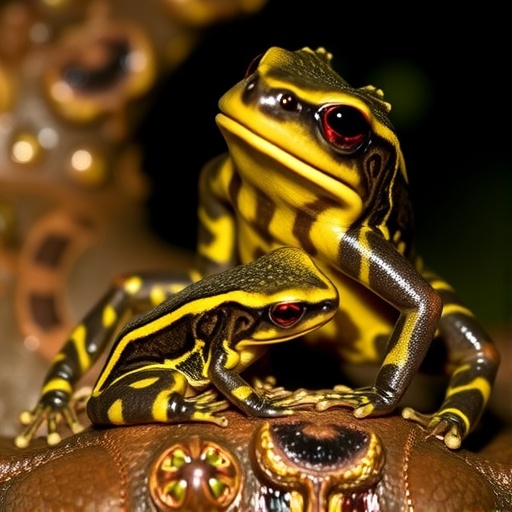In the intricate world of amphibian behavior, particularly among the male poison frogs, recent research has unveiled a surprising and complex set of actions that break from traditional parental investment theories. This groundbreaking study, spearheaded by a collaborative team comprised of Perroulaz, Bégué, and Ringler, poses an intriguing question that digs deep into the instinctual drives of these creatures: “To eat or to care?” The research, published in Front Zool in 2025, offers a rich exploration of the factors that influence male poison frogs’ decisions during the tense and often fraught moments of territory takeover.
Against a backdrop of survival, male poison frogs display a duality in their behaviors that presents a fascinating case study of evolutionary biology. On one hand, these male frogs engage in the responsibilities typically associated with parental care, a strategy that can ensure the passing of genes to future generations. On the other hand, they may opt for infanticidal behaviors that raise eyebrows regarding their instinctual choices. This clash between nurturing and aggressive behaviors presents a paradox worthy of deeper analysis, particularly considering the high-stakes environment in which these frogs operate.
The study’s core inquiry revolves around the evolutionary pressures that shape these behaviors, especially during territory takeovers—classic battlegrounds for dominance among males. Here, the conditions are ripe for conflict, driving them to make decisions that could significantly impact their reproductive success. The researchers meticulously observed these dynamics in naturalistic settings, gathering qualitative and quantitative data that supports their hypotheses regarding male behaviors under varying ecological pressures and social structures.
One major finding of the study suggests that the likelihood of exhibiting filial care diminishes in the face of immediate threats or competition. When territory is contested, male poison frogs are more inclined to prioritize self-preservation and reproductive opportunities over nurturing their offspring. This behavioral shift underscores a critical aspect of their life cycle where immediate survival outweighs parental duties, emphasizing the consequences of natural selection on behavior.
In addition to the environmental stresses inherent in territory takeovers, the study also sheds light on the implications of social hierarchy among male poison frogs. When a dominant male encounters an intruder, the ensuing confrontation can lead to drastic decisions, including infanticide. By removing rival offspring, a male might enhance his chances of successfully mating with the female, thereby securing his genetic legacy. Thus, the interactions of these frogs are not merely instinctual but are strategically calculated based on competitive pressures.
Moreover, the study meticulously details how these behaviors can vary significantly across different species of poison frogs, indicating that not all frogs are wired the same way. Each species has adapted its strategies based on unique ecological niches, predation pressures, and social structures. Therefore, an understanding of these behaviors must also account for the species-specific context that informs decision-making in male poison frogs.
Biologically, the findings align with a key element of evolutionary theories, particularly regarding reproductive strategies and parental investment. Male poison frogs exemplify the strategic trade-offs organisms often face between maximizing reproductive success and ensuring offspring survival. The intricate balance of being both a caretaker and a competitor reveals the multifaceted nature of their existence, underscoring the fundamental principles of survival in the animal kingdom.
The research team’s work is also poised to contribute significantly to ongoing discussions about sexual selection and parental investment across various taxa. By elucidating the mechanisms behind infanticidal behavior in this group of amphibians, their findings may invite comparative studies in other species that exhibit similar behavioral complexities. This line of inquiry could broaden our understanding of how these dynamics play out across multiple realms of the animal kingdom.
The implications extend into practical conservation considerations as well, especially as habitats face increasing pressures from human encroachment and climate change. Understanding the forces that drive parental and infanticidal behaviors in these frogs could inform conservation strategies aimed at preserving not only specific species but also the ecological balance within their habitats. Insights from this research may aid in multifaceted approaches, emphasizing the need to consider behavioral ecology in conservation frameworks.
Viewer engagement is also critical in disseminating findings like these, which may influence not only scientific communities but also public perceptions of these remarkable creatures. Engaging imagery, educational outreach, and interactive discussions can foster greater appreciation and concern for male poison frogs and their ecosystems.
Ultimately, the study encapsulates a moment of epiphany in amphibian behavioral research, bridging the often-divergent paths of parental care and the instinct for dominance. Perroulaz, Bégué, and Ringler’s work not only opens doors to myriad questions about evolutionary adaptations but also enriches the dialogue around the complexities of survival in nature. As research continues to unfold, the narrative of ‘to eat or to care’ deepens, unveiling the layers of behavior that shape the lives of male poison frogs in their quest to navigate a world where every decision can have rippling consequences.
In conclusion, the researchers’ groundbreaking observations challenge our understanding of parental roles and aggressive behaviors in male poison frogs. As we seek to comprehend the intricate decision-making processes that characterize their existence, the importance of ongoing research in behavioral ecology becomes increasingly evident. By elucidating these fascinating dynamics, the study not only enhances our appreciation for these amphibians but also provokes critical considerations for their future amid a rapidly changing environment.
Subject of Research: Factors shaping parental and infanticidal behaviors in male poison frogs during territory takeover.
Article Title: To eat or to care? Factors shaping parental or infanticidal behaviours in male poison frogs during territory takeover.
Article References:
Perroulaz, L., Bégué, L. & Ringler, E. To eat or to care? Factors shaping parental or infanticidal behaviours in male poison frogs during territory takeover. Front Zool 22, 12 (2025). https://doi.org/10.1186/s12983-025-00567-1
Image Credits: AI Generated
DOI: https://doi.org/10.1186/s12983-025-00567-1
Keywords: male poison frogs, parental behaviors, infanticidal behaviors, territory takeover, evolutionary biology, parental investment, survival strategies, amphibian behavior, ecological pressures.




